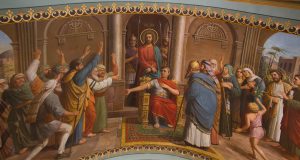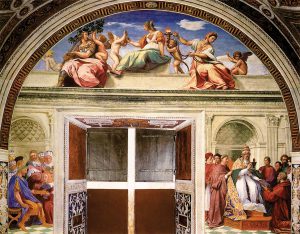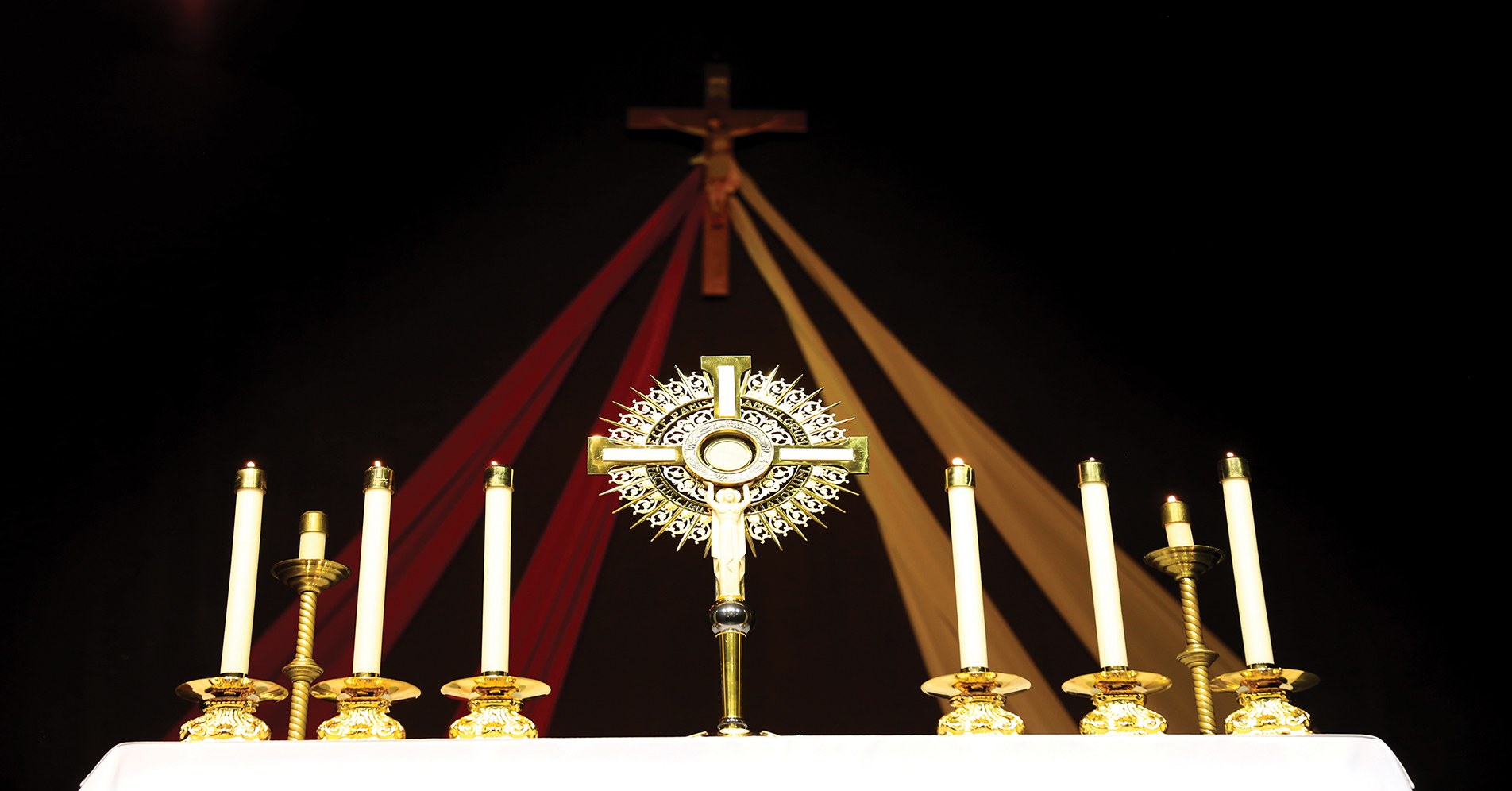
By Renae Kranz
I have lots of excuses not to go to eucharistic adoration: it’s intimidating, I’m too lazy, too busy, have to work, it’s too early, too late, right in the middle of the day, and what would I do for an entire hour anyway?
I don’t think I’m alone in those excuses.
But then the disappointed words of our Savior to the apostles in the Garden of Gethsemane ring in my ears as if He’s saying them directly to me:
“You could not keep watch with me for one hour?” (Mark 14:37)
His words cut to the heart of it.
I think it’s way past time to go to adoration.
Make us long for you Lord
Eucharistic adoration is simply worshiping the real presence of Jesus in the form of consecrated bread and wine—fully the body, blood, soul and divinity of our Savior in the Eucharist. It is an extension of the Mass.
The Catholic Church teaches us adoration of the Eucharist extends our union with Christ after we receive Him during Mass. This worship of Jesus outside of Mass helps us maintain what we received during Communion.
When we put Mass and adoration together, we first consume our Lord so He becomes part of us, and then we gaze on Him in adoration while He gazes on us in total love. Pope Emeritus Benedict XVI explained it beautifully while still Cardinal Ratzinger in God is Near Us: The Eucharist, Heart of Life:
“Communicating with Christ demands that we gaze on him, allow him to gaze on us, listen to him, get to know him. Adoration is simply the personal aspect of Communion. … God is waiting for us in Jesus Christ in the Blessed Sacrament. Let us not leave him waiting in vain! Let us not, through distraction and lethargy, pass by the greatest and most important thing life offers us.”
Before Jesus left the apostles to return to His Father, He told them He would be with them always. He is with us still in the Eucharist, resting silently in the tabernacle of every Catholic Church in the world. The words of Pope Saint John Paul II invite us to adore Christ in those very tabernacles.
“The Church and the world have a great need for eucharistic worship. Jesus awaits us in this sacrament of love. Let us not refuse the time to go to meet Him in adoration, in contemplation full of faith, and open to making amends for the serious offenses and crimes of the world. Let our adoration never cease.”
Our Lord desires that we spend time with Him and increase our longing for Him. It is a witness to our belief as Catholics that He is truly present at Communion and later in the tabernacle. And graces abound when we give ourselves to Jesus in adoration.
Visit Him and you’ll be changed

The Presentation Sisters in Aberdeen know all about the graces that come from adoration. It has been woven into the life of the sisters, and it grounds who they are. Sister Mary Thomas says it brings a sense of internal quiet for the sisters individually and as a congregation, especially in a world in constant flux.
“It helps to bring us to a place of deep peace and in some ways a stability as we ponder the broader scope of things, not just get caught up in the narrow focus of today or this week,” Sister Mary says. “It’s not just me and God. It’s how do I grow into deeper union with God and with others in God? It’s moving into a like-mindedness with Him.”
The Presentation Sisters began the first regular adoration of the Eucharist in our diocese in 1906 when Bishop Thomas O’Gorman wrote to Mother Joseph Butler. He asked the sisters to set up regular adoration to be done in perpetuity to pray for the needs of the diocese.
“We really believe this has fit in so well with our own spirituality because we are contemplatives in action,” Sister Janice Klein explained. “Our foundress Nano Nagel spent hours and hours in front of the Blessed Sacrament.”
The two women recalled how Nano Nagel prayed so often in eucharistic adoration she got ulcers on her knees. She went out during the day to teach in her schools in secret because teaching Catholicism at that time in Ireland was illegal. At night Nano Nagel carried food and medicine to the needy led by the light of her lantern through the tiny lanes of Cork, Ireland.
Even after those long hours, Nano Nagel’s dedication to our Lord in the Eucharist was unwavering. She spent hours at the end of her day in prayer. Sister Mary says all those hours at prayer developed her sense of care and justice for those at the margins and are the foundation of the congregation’s spirituality today.
Although adoration is a powerful part of the Presentation Sisters’ prayer life, Sister Mary says it’s not a magic bullet all by itself. They receive the Lord in the Eucharist at Mass, pray the morning and evening prayer office with the community, and offer personal prayers.
“The face of Christ comes to us and meets us at the door in a variety of ways. And so it’s not just at the adoration chapel,” Sister Mary says. “But if I can’t see Christ in the Eucharist, the bread, then how am I going to see Christ in others as we meet? If you want to be the presence of Christ [to others], then you’ve got to look upon Christ.”
One way to meet Christ and get to know Him is to surrender to His will in prayer. When we do this, we open ourselves up to those graces mentioned earlier. And the greatest part about receiving those graces from God is that we can then give them back to others.
“When we’re praying we’re bringing, in some sense, the whole world into that little bitty adoration chapel,” says Sister Janice, “and the blessings are rippling out, enveloping the whole world in blessing. It’s about bringing all of God as in the world together into one.”
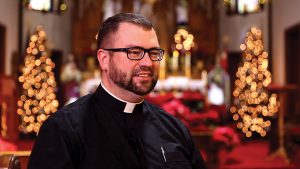
Father Anthony Urban, pastor at St. Wenceslaus Parish, Tabor, and St. John the Baptist Parish, Lesterville and Sigel, says the fact we use the word “adoration” to describe this type of prayer shows an intimacy that we don’t offer to just anyone. And he also recognizes it’s not always easy to establish a regular prayer life, especially one that involves leaving the house. But its value far exceeds any inconvenience.
“Adoration gives us that really focused time to be able to say, I’m here. I’m going to put everything else aside. I’m going to try to pray,” Father Urban says. “We only need to open the newspaper up or listen to the radio to know that there are plenty of things to pray about, including in our own families, parishes and workplaces. Plenty of people need our prayers and attention to intercede for them.”
For Father Urban, the element of silence in adoration refreshes the spirit. He says we can just have a conversation with God, telling Him what’s going on in our lives during our time with Him. We can be frank and honest because our Lord wants to hear from us and how we’re really feeling.
“Even though He knows all the needs of our hearts, He still wants us to express them, either in words or without words,” Father Urban says. “And sometimes it might not be the most cohesive prayer. I might be distracted, or I might be tired, or I might take a little bit of a doze, but I want to be with the Lord.”
That desire to be with the Lord will only grow as you establish the habit of visiting Him in adoration of the Blessed Sacrament. Although the Real Presence is hidden from our senses, our faith tells us He is there and He is listening. Many find their lives changing in ways they never imagined.
Good fruit comes through adoration
Spending time in adoration can be a sacrifice, but it’s a sacrifice that produces the most amazing fruits. Several parishes in our diocese have perpetual adoration chapels or periodically offer dedicated adoration time throughout the church year. They’ve seen great growth in the vibrancy of their parishes through adoration.
Father Charles Cimpl, pastor at Holy Spirit in Sioux Falls, says he has seen wonderful fruits come from having an adoration chapel. The founder of the parish, Monsignor James Andraschko, wanted it to be a stewardship parish. Father Cimpl explained that since the main pillar of stewardship is prayer, Monsignor Andraschko understood that building a perpetual adoration chapel would be vital to accomplishing the goal of a stewardship parish.
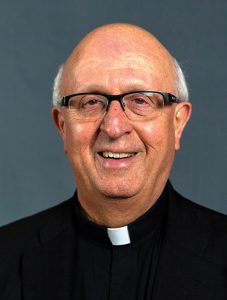
The chapel is the core of prayer life in the parish today. Father Cimpl says people come day and night to pray, some for an hour at a scheduled time, some at random times for a few minutes with Jesus.
“There is one person I see every morning. He pulls up in his truck before work and stops in to say a prayer,” Father Cimpl said. “Recently I asked him why he does so. He simply stated, ‘I want to begin the day in the sacred presence of the Lord so I can be His servant all day long.’”
Children from Holy Spirit School sometimes end their day in the adoration chapel, stopping in for a little prayer before mom and dad pick them up.
“As Catholics, the Eucharist is our treasure,” Father Cimpl says. “We celebrate it on Sundays of course, but by praying in the presence of the Blessed Sacrament we can extend those graces into our daily life. Having the sacred presence of the body of our Lord in our midst can draw us even more deeply into our relationship with our loving Lord.”
Father Urban has seen parishes dedicating adoration hours to pray for specific needs. Many pray for an increase in vocations in the diocese. He says when he was in seminary he saw a definite correlation between those prayers offered in adoration and the number of men and women entering the priesthood and religious life.
That time in front of the Lord helps us all discern our own vocation as well.
“When we allow ourselves to be present to our Lord and have quiet time with Him, we have to honestly think about whether we will just sit on our thumbs or will we get to work and ask those honest questions that we need to address,” Father Urban says. “Am I happy with where my life is heading? If yes, then keep going and continue to ask our Lord into that. But if I’m not, then what has to change, and again, ask our Lord into that to help us figure out what does need to change.”
He has seen these types of changes happen when students encounter the Lord in adoration at events like youth conferences, discipleship camps or at university Newman Centers. It’s all part of those beautiful fruits of the Holy Spirit.
The Presentations Sisters have seen those fruits of the Holy Spirit over and over in their time in adoration. It fit their spirituality right from the beginning and has helped form them as a community over time. Sister Mary isn’t sure if Bishop O’Gorman saw that in the sisters when he asked them to start adoration, but it has worked out in the best way.
“Adoration is really a loving look at God and the world,” Sister Mary says. “That prayer sends us out in mission. That’s the Gospel, to care for one another. Adoration gives us the fortitude to be able to go out and stand with the poor and those on the margins, the underdogs, the people who are looked down upon.”
She says they as a community want to exemplify the fruits of the Holy Spirit: patience, kindness, joy, gentleness, fortitude and courage. They live their lives that way when they are connected with God and with Jesus. They live that way because that’s how He lived.
“We adore the Eucharist to be like Jesus, to be in union with and then become like Jesus, gradually in our best selves,” Sister Mary says. “We invite God to go out into the world with us.”
Go be with Jesus
Anyone can spend time with Jesus in the Blessed Sacrament. Stop in at a parish for a few minutes or even an hour. If you have an adoration chapel near you, slip in when you can to refresh your soul.
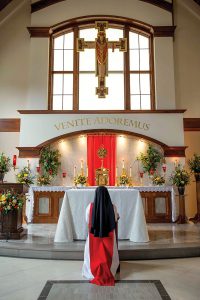
A beautiful option is the adoration chapel at Mater Ecclesiae Monastery on the St. Joseph Cathedral campus in Sioux Falls. This monastery and chapel came about through the invitation in 2002 from Bishop Robert Carlson to the Perpetual Adoration Sisters of the Blessed Sacrament to create a community in our diocese. Through much support for their charism of prayer, the people of the diocese helped build their monastery dedicated to intercessory prayer in front of the Blessed Sacrament.
The perpetual adoration chapel at Mater Ecclesiae is open daily to the public for prayer. Requests for intercessory prayer through the sisters can be sent to them through their website at perpetualadorationsisters.org. It’s a wonderful place to spend time with our Lord.
When you start your own adoration practice, you can start small and work your way up to an hour if you’d like. There are no rules on time.
Sister Mary has good advice about getting started. She says not to commit to a goal that’s too big for you in the beginning. That’s a trick of the evil one. He works to have us choose goals that we aren’t capable of sustaining at the moment, even if it’s a good and spiritual goal such as adoration for an hour each week. When we start to slip and miss one or two, we feel we’ve failed and stop altogether. She says it’s better to start with baby steps.
“We grow in our capacity to hold the silence,” says Sister Mary. “It’s better to start small and increase as the call comes.”
Father Urban suggests leaving your phone at home or in the car so it can’t distract you. It’s best to set everything of the world aside and just spend time with the Lord truly present in the Blessed Sacrament.
If you’re like me and don’t know what to do while at adoration, keep reading for some helpful suggestions. The important thing is to just get started. Bring Mary as your companion and guide. Ask her to help you prepare your soul to be receptive to her Son.
This is precious time with the Lord. Spending more time with Him makes us more like Him. Bring everything you have and give it to Him. He’s waiting for you.
What does eucharistic adoration look like?
The word adoration comes from the Latin words “ad orare” which mean “to pray to.” The Church offers several ways to adore our Lord in the Eucharist.
Perpetual Adoration: This is a beautiful practice done in a designated chapel that can be started in any parish with space set aside for it. The Blessed Sacrament may be exposed in a monstrance at the altar or be reserved in the tabernacle. Adorers sign up for each hour around the clock every day to pray, worship, atone or just sit in silence before God.
Holy Hour: You might hear adoration called a “holy hour.” A holy hour refers simply to the hour you spend in adoration, usually at the same time each week. It’s like an appointment you make with God to get to know Him better. It should be considered the most important appointment of your entire week.
Visits to the Blessed Sacrament: If your schedule doesn’t allow you to commit a dedicated time each week for adoration, just stopping into a church or chapel to pray for five or 10 or 30 minutes when time allows is a great way to refresh your week. Just check the sanctuary lamp near the tabernacle to make sure it’s burning—a sure sign the Lord is there with you.
40 Hours Devotion: During this period of adoration, the Eucharist is exposed for 40 hours and adored to honor the time Christ spent in the tomb. No one person adores for 40 hours, but similar to perpetual adoration, adorers are present with the Lord for one-hour increments.
Benediction: This is a form of blessing which can be done at any time during the church year. The consecrated host is exposed in a monstrance (a Latin word that means “to show”) and those attending spend time in adoration. Prayers are said, hymns are sung (specifically the Tantum Ergo) and the priest incenses the Blessed Sacrament. The priest returns the Sacrament to the tabernacle after the Divine Praises are prayed.
Processions: Eucharistic processions usually use the monstrance as well to carry Jesus in the Eucharist out to the people like a parade. The most common eucharistic procession is done during Corpus Christi. The monstrance is carried by the priest, sometimes under a canopy, with altar servers leading the way carrying the crucifix and candles and the people following behind the Blessed Sacrament.
Helpful tips and insight
What does adoration do for you?
Pat Johnson: When I enter the Adoration Chapel at Holy Spirit I feel like I’ve come to visit a very dear friend who’s been looking forward to my visit. I feel comforted when I leave and reassured that I need to be still and know that He is God and that He has my back. My heart talks to the heart of Jesus.
Sue Winters: Adoration provides a special time in which I feel a unique and close connection to God. It gives me renewed hope, guidance and a sense of peace that no other source can provide.
Ted Thie: Adoration is the time for me to leave the stress of the day at the door and just spend some time with God asking for His help to persevere through those things that may keep me from doing His will in my life.
Theresa Russell: I felt an amazing peace and contentment during that hour that I had never felt before. It also seemed to lessen the anxiety and stress for me during the week.
Sam Nestase: Mass is a wonderful thing, being able to receive the Lord. But being able to just sit in quietness with Him, it’s a wonderful thing as well.
Why do you do it?
Pat Johnson: I’ve become aware of feeling an intense closeness with Christ. The time in the chapel has solidified my relationship with Him.
Sue Winters: Adoration gives me peace, renews my spiritual life, and helps me increase my faith, hope, and love for my Lord and Savior.
Ted Thie: I do it because it gives me faith, confidence and strength to persevere each and every day toward the ultimate goal.
Theresa Russell: He always seems to find some way to calm my fears and answer my prayers.
Sam Nestase: Adoration gives you the time to really visit with the Lord and then to listen to the Lord. It’s got to be a way of life.
How to avoid distraction
Sister Janice: It happens. I just think to myself, this is who I am and then thank God for taking me as I am. Sometimes it’s the best self I could bring today and I try to not be judgmental of myself.
Sue Winters: From the minute I kneel, I ask the Holy Spirit to guide me. I ask God to help me especially if I arrive stressed or overwhelmed from having a really busy day.
Ted Thie: I don’t, but I am always trying to improve every day I go to adoration. My imperfections give me the determination to strive towards the perfection of eternity.
Theresa Russell: You should never be concerned about being distracted. Jesus already knows all your thoughts and prayer requests and loves you regardless of your distractions. Turn those distractions over to Jesus and ask for his guidance and grace concerning them. Immediately you are again focused on Jesus.
Other things to do at adoration
- Divine Mercy Chaplet
- Stations of the Cross
- Let Mary come with you
- Repent of sins
- Pray the rosary
- Ask special saints for intercession
- Sing
- Ask God for your needs
- Pray for others
- Pray for vocations
- Offer thanksgiving and gratitude
- Wait for the Lord to speak
- Read the psalms or small piece of one
- Read from a spiritual book or scripture
- Use books like Magnificat or Word Among Us or Living Faith
- Pray the Liturgy of the Hours (or part of it)
- Cry when you need to
- Be quiet and present with God
Recommended Resources
“How to Make a Holy Hour” by Fr. George W. Kosicki, CSB (pamphlet)
“Manual for Eucharistic Adoration” by The Poor Clares of Perpetual Adoration
“Miracle Hour: A Method of Prayer That Will Change Your Life” by Linda Schubert
“Visits to the Most Blessed Sacrament and the Blessed Virgin Mary” by Saint Alphonsus Liguori
“21 Ways to Worship: A Guide to Eucharistic Adoration” by Vinny Flynn
“The Presence: The Spirituality of Eucharistic Adoration” by Sr. Joan Ridley, OSB

